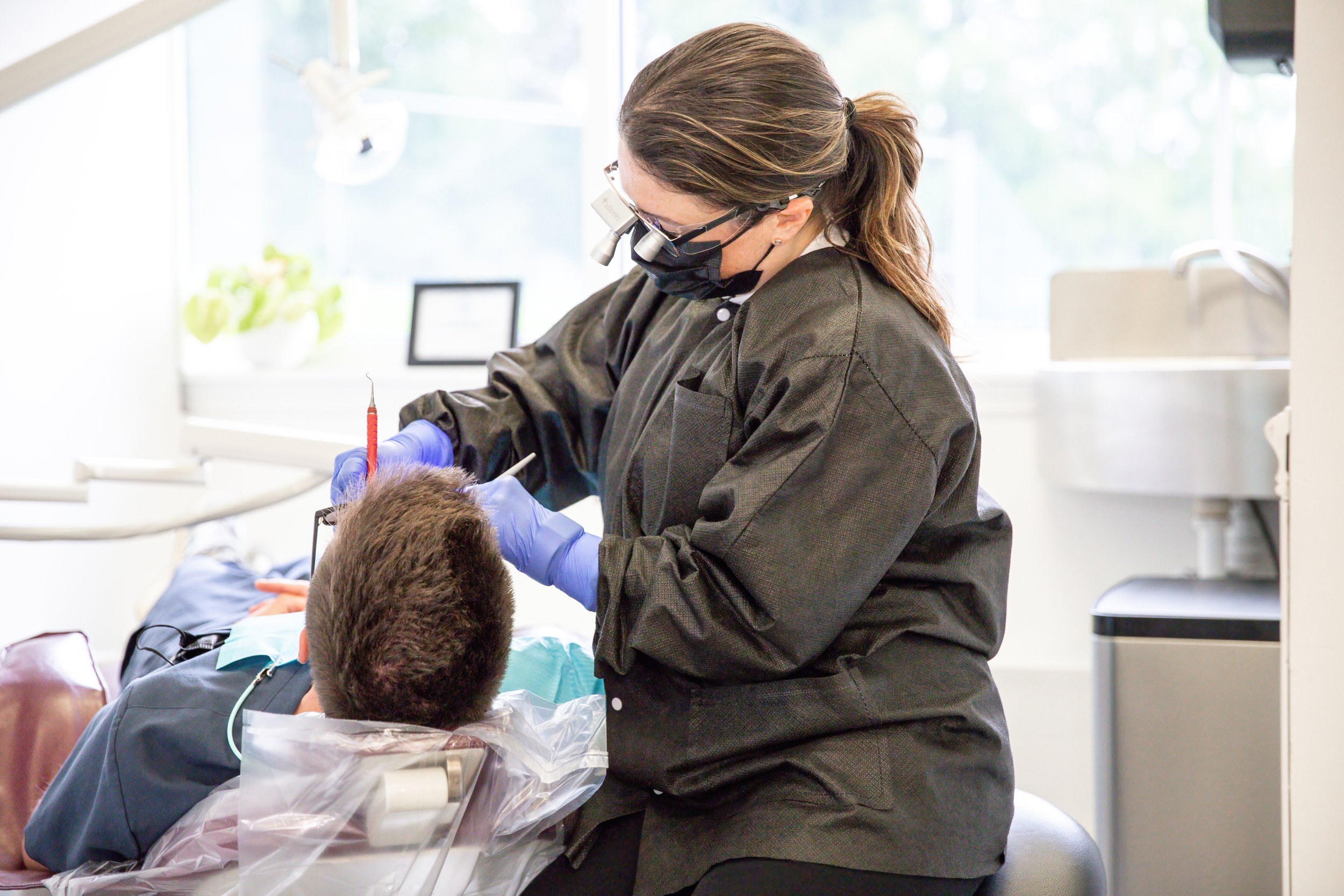
Deep Cleaning
Deep cleaning goes beyond a typical teeth cleaning. It can help keep your mouth healthy and prevent gum disease.
What is deep cleaning?
Deep cleanings, often referred to as scaling and root planing, can address various dental issues by eliminating both soft and hardened plaque from beneath the gum line. This process not only promotes gum healing but also helps prevent tooth and bone loss, as well as the progression of gum disease.
Who should have deep cleaning?
If you're noticing bleeding while brushing or flossing, or if your teeth seem to be shifting, it may be time to consider more than just a standard cleaning. Deep cleaning can help prevent and address gum disease which is a long-lasting bacterial infection that impacts the gums and the bone that supports your teeth.
Schedule an appointment
If you’re experiencing issues with your gums, we encourage you to contact us at 828 Dental today to set up an appointment. You can reach our Asheville, North Carolina office by filling out our online contact form or calling us at (828) 505-3410.
Answers to common questions about gum disease and deep cleaning.
-
Gum disease refers to a long-lasting bacterial infection that impacts the gums and the bone that supports your teeth. It occurs when plaque builds up along the gumline, leading to inflammation of the gums. Ideally, healthy gums should look coral pink, feel firm, and have a defined edge where they connect to your teeth. The initial phase of gum disease is known as gingivitis. During this stage, the gums may become red, swollen, and prone to bleeding, but typically, there is minimal to no pain associated with gingivitis. If left untreated, gingivitis can progress into periodontal disease, and you can start to lose bone around your teeth.
-
Gum disease is primarily caused by the accumulation of plaque. When plaque is not removed daily through brushing and flossing, it can harden into tartar. This hardened plaque harbors bacteria that can irritate the gums and damage the fibers that secure the gums to the teeth, leading to the formation of periodontal pockets filled with bacteria. This situation can result in serious infections, pain, and swelling, and may even cause teeth to loosen, necessitating their removal. Additional factors that can contribute to gum disease include smoking, pregnancy, stress, teeth grinding, poor diet, diabetes, and genetic predispositions.
-
Absolutely. Individuals with gum disease may face a higher risk of developing heart disease or struggle with blood sugar management. Additionally, pregnant women with gum disease are at an increased risk of delivering preterm or low birth-weight babies compared to those with healthy gums.
-
In the initial phases of gum disease, treatment typically includes a specialized cleaning known as scaling and root planing. Once local anesthesia is administered, a mix of ultrasonic tools and hand scalers will be utilized to carefully and effectively eliminate harmful deposits from your teeth. Scaling focuses on removing tartar from both above and below the gum line, while root planing smooths out rough areas on the tooth root where bacteria can accumulate, helping to clear out germs from your mouth. Dr. Swift might also recommend specific mouthwashes or topical treatments. In more severe cases, a Periodontist may need to perform surgical procedures to eliminate infected gum tissue or teeth.
After the treatment, you'll have a follow-up appointment scheduled four to six weeks later to evaluate the reduction of pocket depth, the overall health of your gum tissue, and your home care routine. It's advisable to maintain a recall schedule of every three to four months for regular dental cleanings until the bacteria is cleared, your home care has improved, and the pockets have shrunk to a manageable size. We’ll be with you every step of the way, and your gums will thank you!
-
Removing plaque through daily brushing and flossing, along with visiting your dentist for cleanings twice a year, is the most effective way to reduce your chances of developing gum disease. You also can lower your risk by maintaining a healthy diet and avoiding tobacco products.
-
Payment will be collected at the time of service. If you don't have insurance, you can opt for our 828 Membership Plan.
Our membership plan is not insurance and is not a qualified health plan under the Affordable Care Act.
Our membership plan includes a 30-day money back guarantee. You can receive a full refund for up to 30 days after purchase if no benefits of the plan have been used.
Payment for any treatment not included in the membership plan is due at the time of service. The membership plan benefits may not be combined with insurance, other offers, or discounts. Some exclusions may apply.
